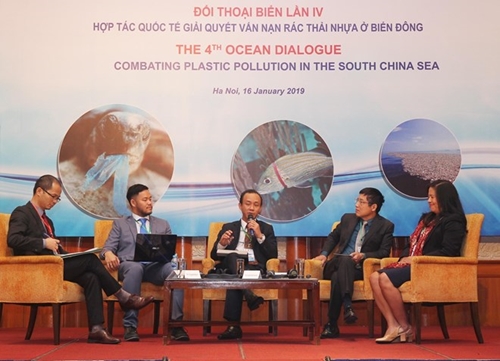The event was co-organized by the Diplomacy Academy of Vietnam, the Australian Embassy, and the German-based Konrad-Adenauer-Stiftung (KAS) Foundation.
At the dialogue, Professor Carmen Ablan Lagman from the Philippines’ De La Salle University, with 20 years of experience in the field, pointed to single-use plastics and industries such as cosmetics, oil refinery, and tyre manufacturing as sources of microbeads.
    |
 |
|
The dialogue in Hanoi on January 16 talks international cooperation in combating plastic pollution in the East Sea. |
She said plastic waste in different forms can exist for at least 100 years, posing serious health risks for humankind.
According to the professor, alongside the rising rate of plastic pollution in ASEAN, the well-being of local people is under threat as their consumption of seafood is three times higher than those living in Western countries.
She urged regional nations to make specific moves in addressing single-use plastics, and industries and businesses which produce microbeads to work with governments in effectively treating the waste.
If countries share their waste treatment technologies, particularly recycling, the issue of marine plastic pollution is likely to be improved, she suggested.
Gilang Kembara from the Indonesian Center for Strategic and International Studies said the nation has made a commitment to cutting plastic waste by 2025, but has yet to issue any specific policies.
Underscoring the importance of raising public awareness of plastic pollution at sea and the effects of the daily use of plastic products, he said pressure from key people and localities could force the government to make regulations on plastic use.
Considering marine plastic waste a global problem, Dr. Julyus Melvin Mobilik from Malaysia said no country can handle the matter alone and that they need to coordinate common measures to make a real difference.
In the short term, replacement options for single-use plastic items – like bags, cups, and straws – are necessary, he advised, adding that nations should devise suitable policies to encourage firms to develop technologies that could shorten the lifespan of plastic waste.
Dr. Nguyen Le Tuan, Director of the Sea and Island Research Institute under the Vietnam Administration of Seas and Islands, highlighted Vietnam’s two laws concerning plastic waste, namely the Law on Environmental Protection and the Law on Sea and Island Natural Resources and Environment. The country has also issued a strategy on the sustainable development of Vietnam’s marine economy by 2030 with a vision towards 2045, he added.
He recommended that each country in the region come up with suitable action plans and prepare resources to tackle the issue.
Scientists have estimated that the weight of marine plastic waste will be higher than that of fish in the sea by 2050.
Source: VNA